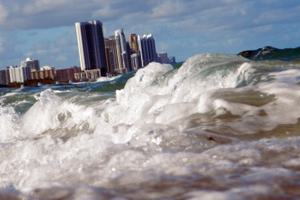Cities
-
Documenting the Swift Change Wrought by Global Warming
Photographer Peter Essick has traveled the world documenting the causes and consequences of climate change. In a Yale Environment 360 photo essay, we present a gallery of images Essick took while on assignment in Antarctica, Greenland, and other far-flung locales.
-
Singapore Takes the Lead In Green Building in Asia
By encouraging the adoption of innovative architectural design and energy-saving technologies, Singapore has emerged as a model of green building in Asia — an important development in a region that is urbanizing more rapidly than any other in the world.
-
A Successful Push to Restore Europe’s Long-Abused Rivers
From Britain to the Czech Republic, European nations have been restoring rivers to their natural state — taking down dams, removing levees, and reviving floodplains. For a continent that long viewed rivers as little more than shipping canals and sewers, it is a striking change.
-
Out of India’s Trash Heaps, A Controversy on Incineration
India is planning to burn more of its trash to generate badly needed electricity. But as the case of a waste-to-energy plant in New Delhi shows, critics are worried about lax air pollution controls and the impact of incineration on people who eke out a living picking through waste dumps.
-
China at Crossroads: Balancing The Economy and Environment
After three decades of unbridled economic growth and mounting ecological problems, China and its new leadership face a key challenge: cleaning up the dirty air, polluted water, and tainted food supplies that are fueling widespread discontent among the country’s burgeoning middle class.
-
People or Parks: The Human Factor in Protecting Wildlife
Recent studies in Asia and Australia found that community-managed areas can sometimes do better than traditional parks at preserving habitat and biodiversity. When it comes to conservation, maybe local people are not the problem, but the solution.
-
Rising Waters
How Fast and How Far Will Sea Levels Rise?
-
Bringing Back the Night: A Fight Against Light Pollution
As evidence mounts that excessive use of light is harming wildlife and adversely affecting human health, new initiatives in France and elsewhere are seeking to turn down the lights that flood an ever-growing part of the planet.
-
Scientists and Aid Experts Plan for a Warmer Future
Climate scientists and humanitarian relief workers need to collaborate far more closely to prepare for a future of increased extreme weather events. In an interview with Yale Environment 360, Harvard University public health expert Jennifer Leaning analyzes the results of a meeting between these two very different factions.
-
Recycling’s ‘Final Frontier’: The Composting of Food Waste
A move by New York City to begin collecting food scraps and other organic waste is just the latest example of expanding efforts by municipalities worldwide to recycle large quantities of unused food and slash the amount of material sent to landfills.
-
With Tar Sands Development, Growing Concern on Water Use
Environmental questions about Canada’s massive tar sands development have long centered on greenhouse gas emissions. Now there are mounting concerns about the huge volumes of water used by the oil industry and the impact on the vast Mackenzie River Basin.
-
In Mekong Delta, Rice Boom Has Steep Environmental Cost
Vietnam has become one of the world’s leading rice producers, thanks to the construction of an elaborate network of dikes and irrigation canals. But these extensive infrastructure projects in the storied Mekong Delta have come at a high ecological price.
-
Our Overcrowded Planet: A Failure of Family Planning
New UN projections forecast that world population will hit nearly 11 billion people by 2100, an unsettling prospect that reflects a collective failure to provide women around the world with safe, effective ways to avoid pregnancies they don't intend or want.
-
Megadrought in U.S. Southwest: A Bad Omen for Forests Globally
Scientists studying a prolonged and severe drought in the southwestern U.S. say that extensive damage done to trees in that region portends what lies in store as other forests worldwide face rising temperatures, diminished rainfall, and devastating fires.
-
Coal Pollution and the Fight For Environmental Justice
As its director of \"climate justice,\" Jacqueline Patterson is leading the NAACP’s campaign to shut down coal-burning power plants in minority communities. In an interview with Yale Environment 360, she talks about the skepticism she faces from her own constituents.
-
For Africa’s Solar Sisters, Off-Grid Electricity is Power
U.S. businesswoman Katherine Lucey is working with a network of women entrepreneurs in sub-Saharan Africa to sell inexpensive, household solar energy systems. In an interview with Yale Environment 360, Lucey explains how solar electricity can transform lives, particularly those of rural women and girls.
-
In Post-Tsunami Japan, A Push To Rebuild Coast in Concrete
In the wake of the 2011 tsunami, the Japanese government is forgoing an opportunity to sustainably protect its coastline and is instead building towering concrete seawalls and other defenses that environmentalists say will inflict serious damage on coastal ecosystems.
-
Will Electric Bicycles Get Americans to Start Pedaling?
Electric bicycles are already popular in Europe and in China, which has more e-bikes than cars on its roads. Now, manufacturers are marketing e-bikes in the U.S., promoting them as a \"green\" alternative to driving.
-
As Final U.S. Decision Nears, A Lively Debate on GM Salmon
In an online debate for Yale Environment 360, Elliot Entis, whose company has created a genetically modified salmon that may soon be for sale in the U.S., discusses the environmental and health impacts of this controversial technology with author Paul Greenberg, a critic of GM fish.
-
Copenhagen’s Ambitious Push To Be Carbon Neutral by 2025
The Danish capital is moving rapidly toward a zero-carbon future, as it erects wind farms, transforms its citywide heating systems, promotes energy efficiency, and lures more people out of their cars and onto public transportation and bikes.

